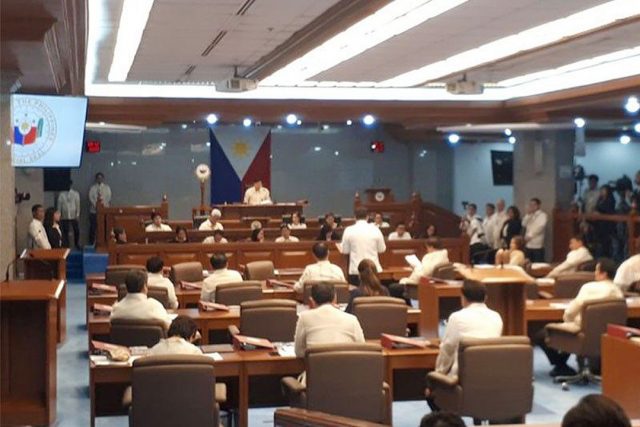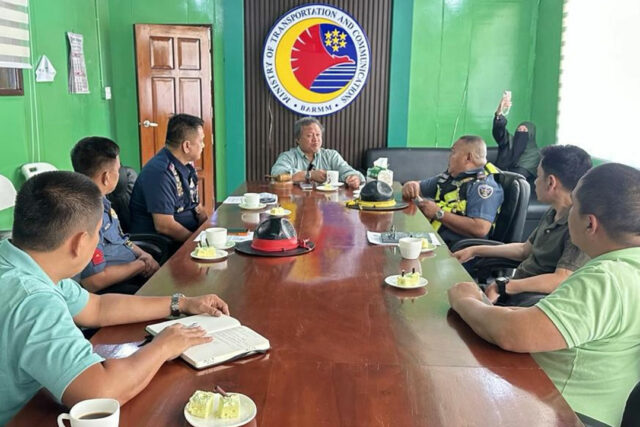Senate seeks to pass 20 priority bills by June as Congress resumes sessions
By John Victor D. Ordoñez, Reporter and Kenneth Christiane L. Basilio
THE PHILIPPINE Senate seeks to pass at least 20 priority measures of the Marcos government before Congress adjourns in late May, including a measure that seeks to impose a 12% value-added tax on digital transactions, the Senate president said on Sunday.
“We will focus all our energies on these 20 measures before we adjourn for the third regular session,” Senate President Juan Miguel F. Zubiri said in a statement. “After that, it is the President’s state of the nation address again and the national budget season.”
Congress will resume sessions on Monday after a monthlong break. It will adjourn sine die on May 24 and lawmakers won’t be back until July 22.
Senators and congressmen are expected to be sidetracked as many of them campaign for reelection later this year for midterm elections in May 2025.
Mr. Zubiri noted that apart from the digital tax measure, eight other bills are pending approval for second reading, including one that seeks tougher penalties on online investment scams and the proposed New Government Procurement Act.
Also up for approval is the proposed Blue Economy Act, a bill overhauling the military pension system, another that seeks to revive compulsory military training for college students and the proposed Enterprise-based Education and Training Program Act.
Also up for second reading approval is a bill that will amend the Universal Healthcare Act and another that will create a national energy policy framework for facilities using waste-to-energy technologies.
“We are confident we can fulfill all of our legislative commitments to the President and to the people before this year ends,” Mr. Zubiri said.
Speaker Ferdinand Martin G. Romualdez said the House of Representatives passed the 20 priority bills before their Holy Week break in March, surpassing the June approval target.
“This achievement not only highlights the House’s dedication to promptly addressing critical legislative matters but also paves the way for a renewed emphasis on oversight functions,” he said in a statement.
“Through rigorous oversight, the House will actively engage in scrutinizing government actions, addressing inefficiencies and safeguarding the integrity of our democratic institutions,” he added.
Last year, the Senate passed measures seeking stricter penalties on farm smugglers, the proposed Self Reliant Defense Posture Act and the Academic Recovery and Accessible Learning Program bill, which are set for bicameral approval.
Both Houses earlier ratified the bicameral conference committee reports on a bill seeking to boost the monitoring of real property sales, the proposed Philippine Maritime Zones Act and another measure establishing the Negros Island region.
Mr. Zubiri said a bill that seeks to set up a national accounting system on ecosystems, forests, watersheds and coastal areas only needs President Ferdinand R. Marcos, Jr.’s signature. The Senate approved it on third reading in November.
Senate committees are also set to tackle a bill on e-governance, another that will create a Department of Water Resources and a measure that seeks to strengthen the country’s internet infrastructure.
The Create More bill, which seeks to cut the corporate income tax to 20% from 25%, was passed by the House of Representatives on final reading last month has been transmitted to the Senate for deliberations, Mr. Zubiri said. “Four of the 20 measures are nearing enactment into law already.”
“The rest are for bicameral committee approval, for second and final reading approval or awaiting committee approval. We are confident we can finish deliberations on these bills in their final stages before we adjourn sine die on May 24.”
‘SENSIBLE STRATEGY’
Meanwhile, political analysts said the House should focus on bills that seek to strengthen local industries, not just the country’s defense amid growing tensions with China. Developing industries would cut the country’s reliance on Chinese products, they added.
“While I agree on defense spending, I insist on treating… industry development budgets in equal vein as they comprise a sensible strategy in reducing our dependence on Chinese supply chains,” Hansley A. Juliano, who teaches political science at the Ateneo de Manila University, said in a Facebook Messenger chat.
“Reducing reliance on Chinese supply chains would effectively free us to further pursue our territorial interests in the Western Philippine Sea,” he added.
Speaker Romualdez earlier said they would focus on bills that aim to strengthen national security and spur economic growth once Congress resumes on Monday.
Mr. Juliano urged the House to focus on bills supporting agriculture and local manufacturing. “Continued imports only enrich our neighbors at our expense. It’s bad economics.”
Bills that seek to strengthen human capital should also be prioritized, Arjan P. Aguirre, an assistant professor of political science at the Ateneo de Manila University, told BusinessWorld via Messenger chat.
Economic and environmental bills should also be given the same attention as national security bills to “address economic growth, waste and resource management, and health and nutritional needs.”
Defense and national security bills should focus on rationalizing the defense budget, including allotting more to military branches dealing with Chinese encroachment in the South China Sea, Mr. Juliano said.
Congress is expected to hasten debates on remaining administration priority bills, including one that seeks to establish the country’s defense industry, Michael Henry Ll. Yusingco, a policy analyst and senior research fellow at the Ateneo Policy Center, said via Messenger chat.
“I expect national security will be the main focus of this administration for the next state of the nation address,” he added.
Mr. Aguirre noted that while the House has passed all 20 priority bills, it is “underperforming” by failing to pass measures on health security, environmental sustainability and enhanced social protection. “These concerns have a more direct impact on the economy than Charter change.”












